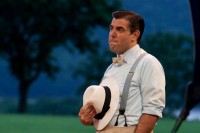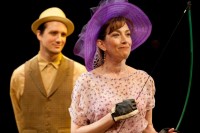Love’s Labor’s Not So Lost at Hudson Valley Shakespeare Festival

At the beginning of “Love’s Labour’s Lost,” actors of the Hudson Valley Shakespeare Festival dramatically approach the audience from the magnificent open space at Boscobel, overlooking the Hudson River. As they make their way to the performance area, the characters, clad in white, are positioned on the field like a pristine Seurat painting.
But wait. What are they doing? Could it be that they are trying to play badminton? Are they really attempting to go fishing? Catch butterflies? It’s “yes” to all of the above and it’s this zany posturing that sets the tone of this rarely performed comedy by the Bard.
Artistic Director Terrence O’Brien’s program notes say that “Love’s Labour’s Lost” is a play about words. Indeed, this is a heady work where wit is a contest of one-upmanship using limericks, rhymes, songs. It’s also about wooing women with words, but as the men become more smitten, their words become less effective until spoken from the heart.

“Love’s Labour’s Lost” shines up the battle of the sexes with neon lights, and in the process, empowers women to speak their mind and enforce their will. The premise, however, does put men at a disadvantage when Ferdinand, King of Navarre, and his three attending lords take an oath to swear off women, food and drink for three years and strictly devote themselves to study–an oath bound to break down. When a French princess arrives with her three attending ladies, the men see the futility of their oath and fumble through reasons to sleaze out of it. The sharp word play and verbal sparring between the men and women leaves the men lagging in response and finally speechless.
Because there is so much emphasis on what’s being said, the play is susceptible to verbal lethargy. But the brilliance of the cast is the ability to fully engage the audience by speaking Shakespeare’s 16th century English using 21st century inflections and rendering a palatable lingo. Each performer is in top form, but a handful of characters steal the show. Michael Borrelli plays Don Adriano, a Spanish knight with slicked-backed hair and a sharp-handled Salvador Dali mustache, decked out in sleek, glittery black revealed by the dramatic sweep of a leopard skin cape.
Borrelli’s hysterical, guttural Latino accent pushes the word play one step further, mispronouncing words that effectively ups the ante of double entendre, including an apropos memorable line: “Sweet smoke of rhetoric!” Adriano falls for Jaquenetta, a wide-eyed “Golly-Gee” dairymaid of quintessential innocence played wonderfully by Gabra Zackman. Together with her counterpart, the witty and sarcastic clown, Costard, played by Ryan Quinn, they are both costumed in overalls and straw hats, their informality jauntily contrasting that of the nobility. Jason O’Connell gives us the love-struck Berowne, one of the king’s attending lords in a poignant, nuanced performance. O’Connell doesn’t merely portray Berowne, he IS Berowne.
Denise Cormier is the quick-witted French princess who won’t let the king come up for air in his slow expression of his love for her, and she leads her three attending ladies in finding fault with the amorous men. Richard Ercole is a convincing Ferdinand, who, as king, must accept his vulnerability when he falls in love.
O’Brien keeps the action rolling and when the second part of the play opens we see the men, their backs to us, bumping and grinding to Barry White’s “Never Gonna Give You Up,” their arms wrapped around themselves feigning the embrace of a woman. When the men conjure a way to see the women by dressing up as Russians, replete with shaggy fur hats and long black beards, the women get word of the masquerade and mask themselves to further confuse the men.
One by one, each man admits his deepening love to us, the audience, and one by one, each man learns of his colleagues’ true feelings. One speaks of his “heavenly love,” and that breaking the oath “is no fault of mine…what fool is not so wise to lose an oath to win a paradise?” Overhearing the lament, Berowne sums up: “This is the liver-vein, which makes flesh a deity, a green goose a goddess: pure, pure idolatry.” And later: “Let us once lose our oaths to find ourselves, or else we lose ourselves to keep our oaths.”
“Love’s Labour’s Lost” runs through Aug. 28. The festival’s other productions include “39 Steps,” adapted from the Alfred Hitchcock movie, and “Romeo and Juliet.” Performances are at the historic Boscobel House & Gardens in Garrison. For info and tickets, call 845-265-9575 or visit www.hvshakespeare.org.
By Abby Luby

Adam has worked in the local news industry for the past two decades in Westchester County and the broader Hudson Valley. Read more from Adam’s author bio here.
